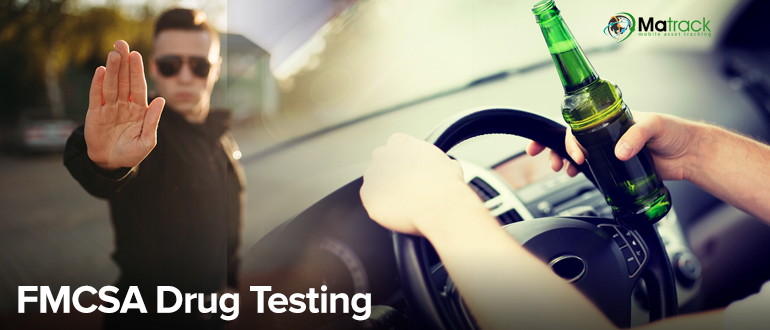Key Takeaways
- FMCSA mandates drug and alcohol testing for CDL drivers to ensure safety and prevent impaired driving.
- Fleet operators must implement a compliant testing program, including pre-employment, random, post-accident, and return-to-duty tests.
- Failure to comply results in severe penalties, including fines, driver disqualification, higher insurance costs, and possible loss of operating authority.
- Maintaining proper records, using certified labs, training supervisors, and staying updated with FMCSA rules help fleets avoid violations.
Understanding FMCSA Drug Testing Requirements
FMCSA drug and alcohol testing regulations apply to drivers operating CMVs that:
- Weigh 26,001 pounds or more
- Transport 16+ passengers (including the driver)
- Carry hazardous materials requiring placards
Employers must ensure all CDL drivers undergo drug and alcohol testing in accordance with FMCSA rules.
What Drugs Are Tested?
FMCSA requires testing for five controlled substances:
- Marijuana (THC)
- Cocaine
- Amphetamines and methamphetamines
- Opioids
- Phencyclidine (PCP)
Alcohol testing is also required, with a legal limit of 0.04% blood alcohol concentration (BAC) for CMV drivers.
Types of FMCSA Drug and Alcohol Tests
Fleet operators must conduct several types of tests to comply with FMCSA regulations. Each test serves a specific purpose in ensuring drivers remain safe and drug-free while operating commercial motor vehicles.
Pre-Employment Testing
Before hiring a new driver, employers must conduct a drug test to ensure they are not using prohibited substances. A driver cannot operate a commercial motor vehicle (CMV) until they receive a negative test result.
Random Testing
Random drug and alcohol testing must be done throughout the year to detect and deter substance abuse. FMCSA requires testing 50% of CDL drivers for drugs and 10% for alcohol annually, using an unbiased selection process.
Post-Accident Testing
Drivers involved in certain accidents must take a drug and alcohol test to determine if substances played a role. Testing is mandatory if the accident results in a fatality, an injury requiring medical treatment, or a citation with vehicle towing.
Reasonable Suspicion Testing
A driver may be tested if a trained supervisor observes behavior that suggests drug or alcohol use. Supervisors must complete at least 60 minutes of FMCSA training each on recognizing drug and alcohol impairment.
Return-to-Duty Testing
Drivers who fail or refuse a test must complete a Substance Abuse Professional (SAP) evaluation and treatment program. Before resuming safety-sensitive duties, they must pass a return-to-duty drug test.
Follow-Up Testing
After passing the return-to-duty test, the driver must undergo additional unannounced follow-up tests. FMCSA requires a minimum of six follow-up tests in the first 12 months, lasting up to 60 months if necessary.
How to Maintain FMCSA Compliance
Fleet operators must follow best practices to avoid penalties and maintain FMCSA compliance.
Establish a Written Drug & Alcohol Testing Policy
- Clearly outline testing procedures and consequences of violations
- Provide the policy to all drivers and employees
Enroll in a DOT-Certified Drug Testing Program
- Use SAMHSA-certified laboratories for accurate testing
- Ensure results are reviewed by a Medical Review Officer (MRO)
Conduct Supervisor Training on Drug and Alcohol Detection
- FMCSA requires reasonable suspicion training for supervisors
- Ensure managers can identify signs of impairment
Implement a Proper Random Testing Program
- Use a third-party administrator (TPA) for unbiased selections
- Conduct tests evenly throughout the year
Maintain Accurate Records for FMCSA Audits
- Keep positive test results, refusals, and violations for 5 years
- Retain negative test results for 1 year
- Ensure records are readily available for inspections
Educate Drivers on Drug and Alcohol Testing Rules
- Provide regular training sessions
- Explain penalties for violations and return-to-duty requirements
Use the FMCSA Drug & Alcohol Clearinghouse
- Report all violations to the FMCSA Clearinghouse
- Check driver records before hiring and annually thereafter
FMCSA Penalties for Non-Compliance
Failure to comply with FMCSA drug testing regulations can lead to serious consequences.
Financial Penalties
- Failing to test drivers: Up to $5,833 per violation
- Allowing a driver to operate after a failed test: $5,833 per offense
- Failure to maintain records: $1,500+ per violation
Driver Disqualification & Out-of-Service Orders
- Drivers who fail a test are prohibited from operating CMVs
- Companies with repeated violations risk FMCSA shutdown
Loss of DOT Operating Authority
- FMCSA can revoke operating authority for serious violations
- Companies may face business closure due to non-compliance
Increased Insurance Costs
- Non-compliant fleets face higher insurance premiums
- Repeated violations make coverage harder to obtain
Legal Liability in Accidents
- If a non-compliant driver causes an accident, the employer may face lawsuits
- FMCSA violations can be used as evidence of negligence in court
Common Compliance Mistakes & How to Avoid Them
Fleet operators must follow FMCSA regulations carefully to avoid penalties and ensure road safety. Here are common compliance mistakes and how to prevent them.
Not Testing New Hires Before Assigning Duties
Every new CDL driver must pass a pre-employment drug test before operating a commercial vehicle. Allowing an untested driver to work violates FMCSA rules and puts your fleet at risk of fines and accidents.
Failing to Keep Random Testing Truly Random
Random drug and alcohol testing must be unbiased and spread throughout the year to meet FMCSA requirements. Using a computerized selection process ensures fairness and prevents compliance violations.
Ignoring Supervisor Training Requirements
Supervisors must complete mandatory FMCSA training to recognize drug and alcohol impairment in drivers. Without this training, they may fail to detect warning signs and miss required reasonable suspicion testing.
Poor Record-Keeping
FMCSA requires fleets to maintain accurate records of all drug and alcohol tests for audits. Disorganized or missing records can lead to hefty fines and legal issues during inspections.
Allowing Unqualified Drivers to Return to Duty
Drivers who fail a drug test must complete the Substance Abuse Professional (SAP) process before returning to work. Letting an unqualified driver operate a CMV can result in severe penalties and increased liability for your company.
Staying Updated with FMCSA Drug Testing Regulations
FMCSA updates its drug testing policies periodically. As of 2025, the FMCSA random drug testing rate remains at 50% for CDL drivers.
Fleet operators should regularly check FMCSA updates on:
- Testing rates
- Clearinghouse reporting rules
- Substance classification changes
The Pipeline and Hazardous Materials Safety Administration (PHMSA) recently increased its random drug testing rate to 50% in 2025, reflecting a trend toward stricter testing across transportation sectors.
Conclusion
FMCSA drug testing compliance is essential for fleet safety, regulatory adherence, and business sustainability. Employers must implement clear drug testing policies, conduct mandatory tests, maintain compliance records, and support driver substance abuse prevention efforts.
By following FMCSA guidelines, fleet operators can avoid penalties, reduce accidents, and maintain a strong industry reputation.



